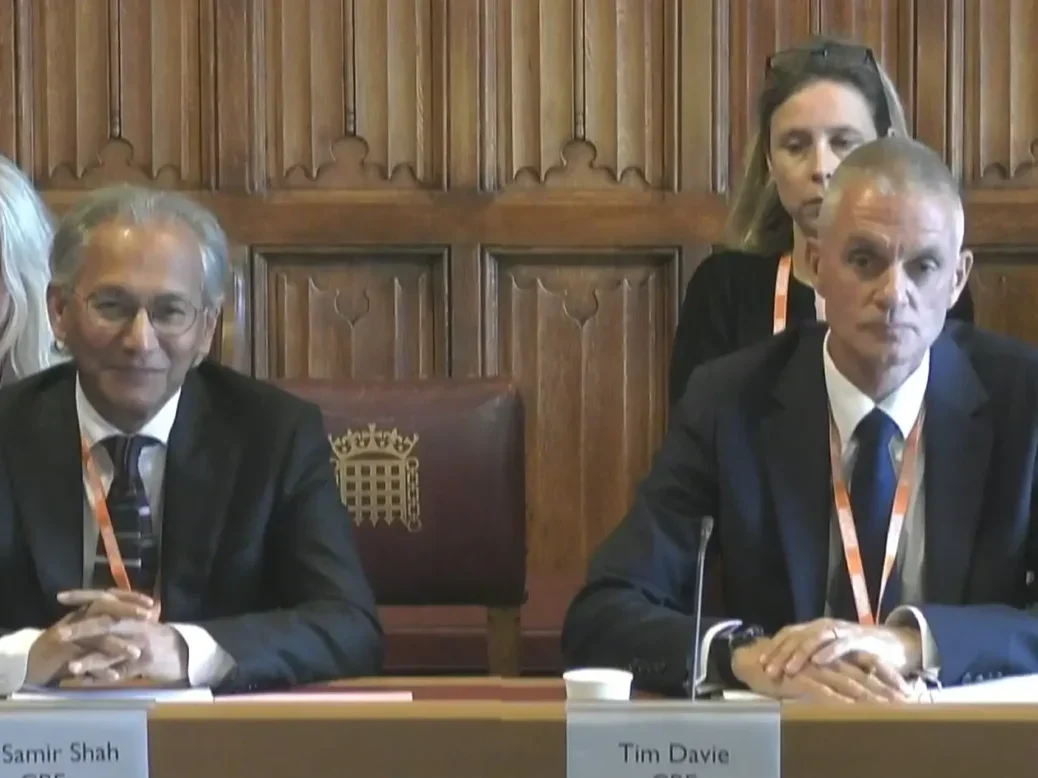
BBC chairman Samir Shah has admitted that disgraced former newsreader Huw Edwards “damaged” the reputation of the corporation.
Director-general Tim Davie and Shah were questioned before the House of Lords’ Communications and Digital Committee on their future strategy, as well as the broadcaster’s funding model amid a decline in licence fee payers.
Davie also gave an update on recovering an estimated £200,000 in pay from Edwards.
When asked about the situation, Shah told the committee: “There’s nothing more important than public trust in the BBC, and we are custodians of that trust and what Huw Edwards did damage the reputation and the trust for the BBC so we take that very seriously indeed.
“I should say, it was a shock to discover, when it was announced, when he was charged, that he had led this double life. On the face of it, a trusted news presenter, but hidden, secretly, he was this figure who did the most appalling things. I mean, let’s never forget the victims.”
He added that he “knew him”, having overseen current affairs at the BBC decades ago, and other staff who worked with him “feel angry and betrayed” by Edwards.
Shah added: “I asked him, as Tim, to give me an account of the decisions they took in the course of that year. We then reviewed those decisions, and we believe, as Tim has said, and we said in our statement that the decisions Tim and his team took were made in good faith.
“These were very complicated decisions, and given the evidence available to them at the time, they made reasonable decisions based on the evidence. So we supported it, and we continue to support it.”
The BBC admitted it was informed that the former TV presenter had been arrested in November but continued to employ him for around five months until he left on medical advice.
He continued to be paid a salary during this period, which the BBC has been attempting to get back following his conviction for making indecent images of children.
Davie said: “We’ve made the formal request, and I can’t go into too much detail, but discussions are under way, but I’ve got no further news, apart from the BBC’s position is clear, the money should be returned, and we made the request.”
When asked if he set a deadline, he said: “I don’t believe we set a deadline… but we do expect to make progress and get an answer.”
Davie also said the BBC will “explore” the legal process if Edwards refuses.
Edwards, 63, pleaded guilty in July to charges of having indecent images of children, with seven of the 41 being of the most serious type, after he resigned from the corporation in April.
Davie also suggested that the BBC could take steps such as dismissal before charge sooner if this happened again.
He said it “was really difficult getting the balance right, because you knew that the arrest had been made”.
Davie said: “Obviously your primary thoughts are people who are impacted, but also you’ve got people who are accused at that point, and you don’t know whether… they’re going to result in charges. So you have a lot of unknowns at that point.”
He also said: “This affair has not been easy for any of us at the BBC, and particularly for those people who’ve been impacted, but I think it’s actually right to look back and reflect and say, what are the learnings here? This is standard practice, but maybe we should be challenging that.”
The broadcaster’s executive previously released a statement on Edwards saying it will “look at lessons from this period, including the BBC’s approach to the rules surrounding payments when employees are suspended”.
During his four decades at the corporation, Edwards announced the late Queen’s death on the BBC in September 2022 and was among the teams leading coverage of historic events including the Queen’s funeral and the coronation of the King in May 2023.
Tim Davie says BBC licence fee flatlining will mean ‘erosion’ of output
During the same hearing, Davie said the recent flatlining of the BBC licence fee spells “erosion” for some of the broadcaster’s output.
He said: “The BBC will be flat in revenue terms, license fee income this year. So we’re not in freefall, but we’ve got some erosion, you’re going to get that with this level of competition.”
Davie added that the BBC had been “disinvested in” by previous Governments.
He said: “The BBC has had a billion pounds taken out of it over the last decade, plus. We haven’t kept flat, we haven’t kept flat funding. We’ve taken out a billion pounds, and we still remain at about £3.7bn” in funding.
Davie also said that without clarity on what the Media Bill means by having public service broadcasters getting appropriate prominence on digital platforms than other British channels will be in “jeopardy” along with the BBC.
“We are doing extremely well in digital,” he added. “We’ve had a fantastic summer for iPlayer. But there’s a lot of risk.”
Email pged@pressgazette.co.uk to point out mistakes, provide story tips or send in a letter for publication on our "Letters Page" blog
